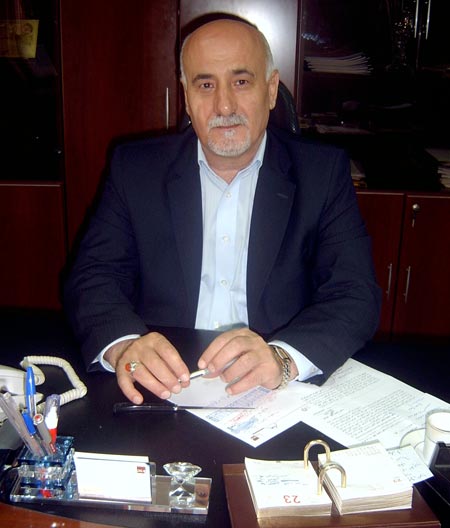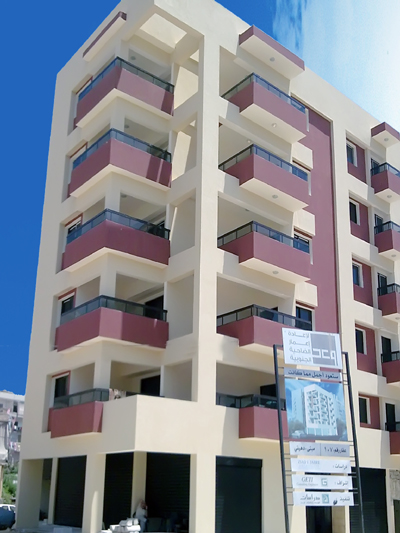
WAAD, A Promise to Restore Life
Four years since the divine victory of the July 2006 war have passed, and people in one way or another, are still living the memory.
The "Israeli" aggression indeed resulted in some thousand of casualties, in addition to a tremendous destruction of the residential areas, especially in the southern suburb of Beirut.
As always, His Eminence Hizbullah Secretary General, Sayyed Hassan Nasrallah was right when calming people not to worry, for their houses will be rebuilt, more beautiful than ever.
From here the road to reconstruction began, and WAAD Rebuild was born.

WAAD, which is Arabic for "Promise", is a project related to Jihad Binaa Company, established for the need of rebuilding and reconstructing demolished areas after the July 2006 aggression on Lebanon, mainly concerned with destructed areas of the southern Beirut suburb.
Pursuing details about the "WAAD" rebuilding process and progress, Moqawama.org conducted an interview with The General Director of WAAD Project, Engineer Hassan Jeshi, who on his part gave us details about the project, which was set to action by the beginning of the year 2007.
"WAAD project started after the "Israeli" aggression on Lebanon which occurred in July 2006, the project dealt with reconstruction of semi-destructed and totally destructed buildings in the Beirut southern suburb, the project started by the mid-2007, where these days mark the 3rd year after the launching of the project to action", Hassan Jeshi said.

Engineer Jeshi added, "The main concern of the project was returning people as fast as possible to their homes. It is mainly a social humanitarian project, and secondly a project for reconstruction, in addition that WAAD is sort of a reply to the "Israeli" brutal aggression and destructions of a residential area, and not a military area".
WAAD General Director said that after 3 years of non-stop work, almost 76% of the total plan is done, where about 126 buildings out of the overall 247 were successfully rebuilt, and yet again, more beautiful than ever.
"Of course WAAD project is not a real-estate company neither it is an investment company, it is mainly set on behalf of the owners, to manage the operation of rebuilding their demolished buildings", Mr. Jeshi stressed.
As most of what happens in regular countries, people might affect in establishing a specific company or project which is revolved over their benefits, and according to Engineer Hassan Jeshi, WAAD was the product of the people's "want", and Hizbullah's "will
Regarding the budget which was said to be $400 million, Jeshi said, "When the project started and was realized that it would be costly, where we conducted more than a Million Meter square, the cost was evaluated to be $400 million. The money of course is funds of the government, and some humanitarian Arab and Islamic organizations".
He also added that the development of building facilities, including the environmental concern, were part of the funded budget.
When asked about whether WAAD felt "threatened" due to the constant "Israeli" threats of re-demolishing the suburbs, including other Lebanese territories, WAAD General Director said, "WAAD is mainly concerned with rebuilding and reconstructing, so in approach to any second or third war, we say that no threats will stop the rebuilding process in any way, because we are committed with the people in this context".
Hassan Jeshi stressed that all what has to do with the "Israeli" threats is political, while WAAD is a strictly humanitarian, social, environmental project that is only concerned with rebuilding and developing.
"The delay which occurred at some time was not as was said to be due to political reasons, but in fact it was due to technical problems, and then we continued our process as normal, although we faced some logistic and technical obstacles", he added.
Jeshi added that as the rebuilding process was interrupted with the departure of some major companies of international and Arabic countries, their work was delayed and the displacement of people was extended.
"These departures did not affect the work though, for we continued as if nothing had happened, with the help of local companies, which are almost 23, with total cooperation", WAAD General Director said.
Engineer Hassan Jeshi said that each company of the helping local company is responsible of a square, or zone, in order to coordinate the work field and make it easier in all aspects, achieving faster and better work.
About the working team, Jeshi said that it is made out of experts in different related fields, whether engineering, law, environment, treasury, and many other levels that maintain a perfect complete company.
Whether WAAD will continue as a company after all demolished buildings are rebuilt, Jeshi said, "This is a worthwhile question, where although our role is to rebuild the buildings after the "Israeli" aggression, the status of WAAD and whether is continues as a private company goes back to Jihad Binaa Company, hoping for the best".
Expressing the relations between WAAD and the owners of the rebuilt buildings, WAAD's General Director said that it was mainly a good relation built on understanding, although there were some misunderstandings which occurred between the owner and the contractor, which according to Jeshi, are normal between any parts in this field of work.
WAAD General Director Hassan Jeshi, stressed that hopefully, with complete loyalty and trust, WAAD will not let go of any effort in achieving this work, hoping that there will not be any obstacle in this context.
Dr. Suhair Berjawi, a citizen, whose house was demolished in the July 2006 "Israeli" aggressions on Beirut's southern suburb, expressed to Moqawama.org her full satisfaction with the hard work that WAAD Rebuild is doing.
"The job WAAD is doing has the trait that it is a 100% legal, in addition to their amazing interaction with people who lost their homes, where they include them in any opinion and discussion regarding their homes before conducting a decision", Dr. Suhair Berjawi said gladly.
A whole of 126 buildings are done, 121 left to go, in order to restore back the true life of the southern suburb, which was once and for ever, filled with hope, faith, peace, and truth within the spirits of its people of resistance.
WAAD sure is a promise, a truthful promise, which keeps the people's memories fresh and honest when thinking that in this beautiful yet cruel hometown, there are some parts that still have deeds to reflect truthful promises for the benefit of the people, not politics.



